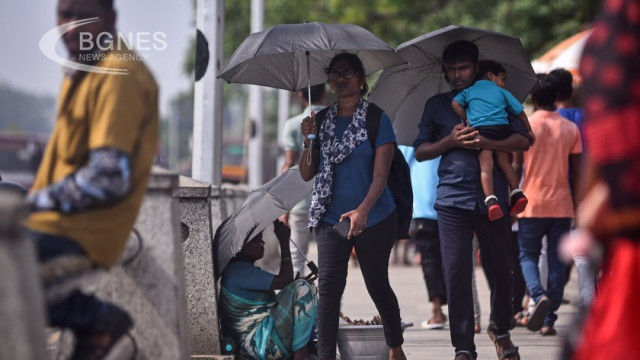When the Indian capital was gripped by brutal heat this summer, Ramesh says he felt abandoned but had no choice but to continue toiling under the scorching sun to provide for his family. "The heat is becoming unbearable," the 34-year-old bricklayer told CNN. "But we have no choice, we have to work".
Ramesh lives with his parents, three brothers, sister-in-law and three children in an overcrowded suburb in west Delhi, a city that has made headlines in recent years as mercury levels regularly rise to dangerous levels.
And when temperatures soared past 40 degrees Celsius in June this year, closing schools, damaging crops and putting pressure on energy supplies, the heat sickened his family too.
Ramesh, who gives himself only one name, says he borrowed $35 - almost half of his monthly salary - from relatives to buy a second-hand air conditioner for his home.
"It makes noise, sometimes it emits dust," he says. But she can't do without him.
According to climate experts, by 2050, India will be among the first places where temperatures will cross the tolerable limit. According to a recent report by the International Energy Agency (IEA), in this period, the demand for air conditioners in the country will grow nine times, overtaking all other appliances.
Ramesh's predicament reflects the paradox facing the world's most populous country of 1.4 billion people: The hotter and wealthier India gets, the more Indians will use air conditioners. And the more they use air conditioners, the hotter the country will become.
According to data collected by the European Union, India emits nearly 2.4 billion tons of carbon dioxide (CO2) annually - with a contribution of about 7% of global emissions. By comparison, the United States causes 13% of CO2 emissions, despite having a quarter of India's population.
This raises the question of fairness that climate scientists have often asked: Should people in developing countries bear the cost of reducing emissions, even though they are among those least responsible for the rise in greenhouse gases?
At the recently concluded COP28 climate talks in Dubai, India was not among the countries that signed a commitment to reduce emissions from cooling systems. In his address to participants in the opening session of the summit, Prime Minister Narendra Modi said that all developing countries should get a "fair share of the global carbon budget"./BGNES







